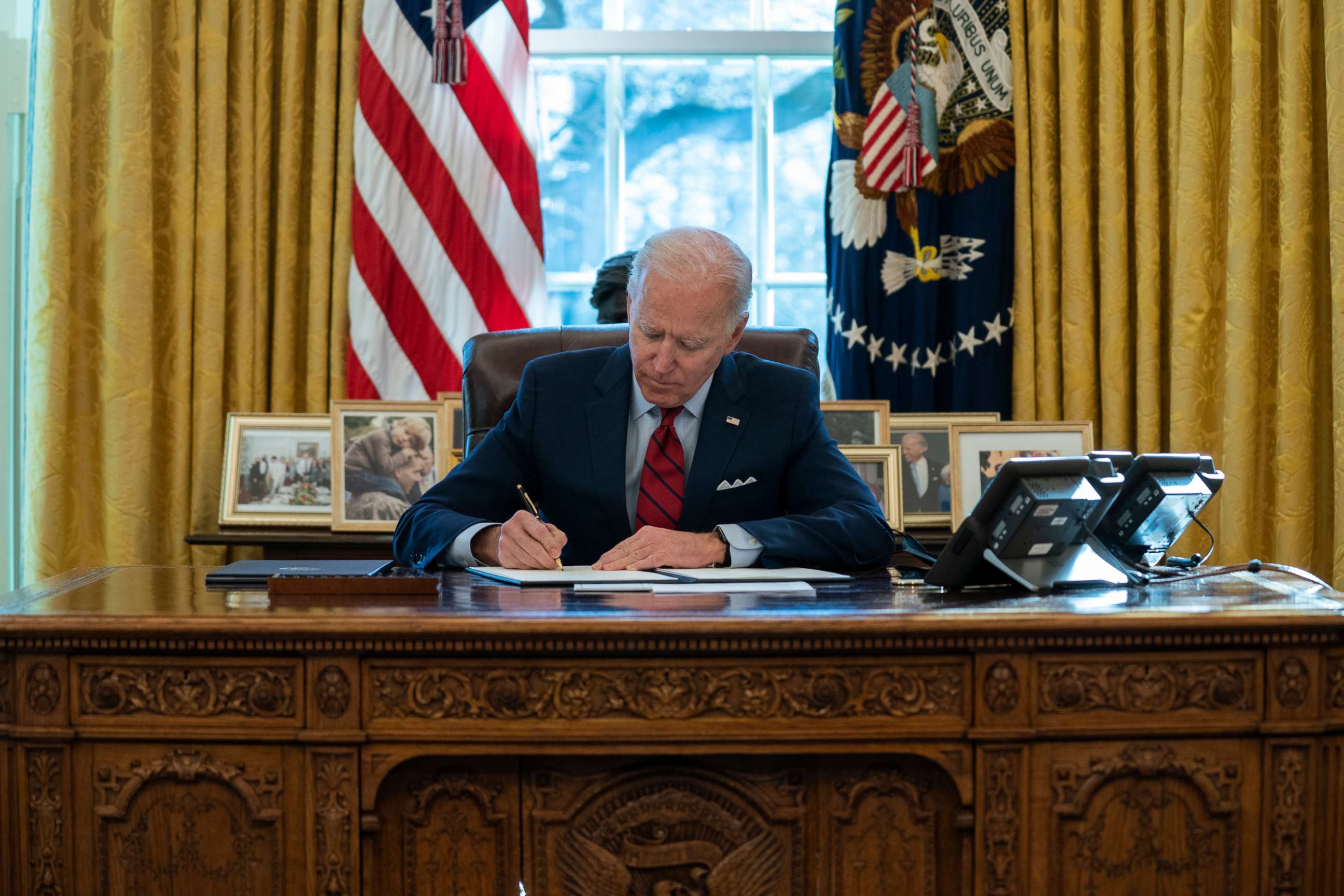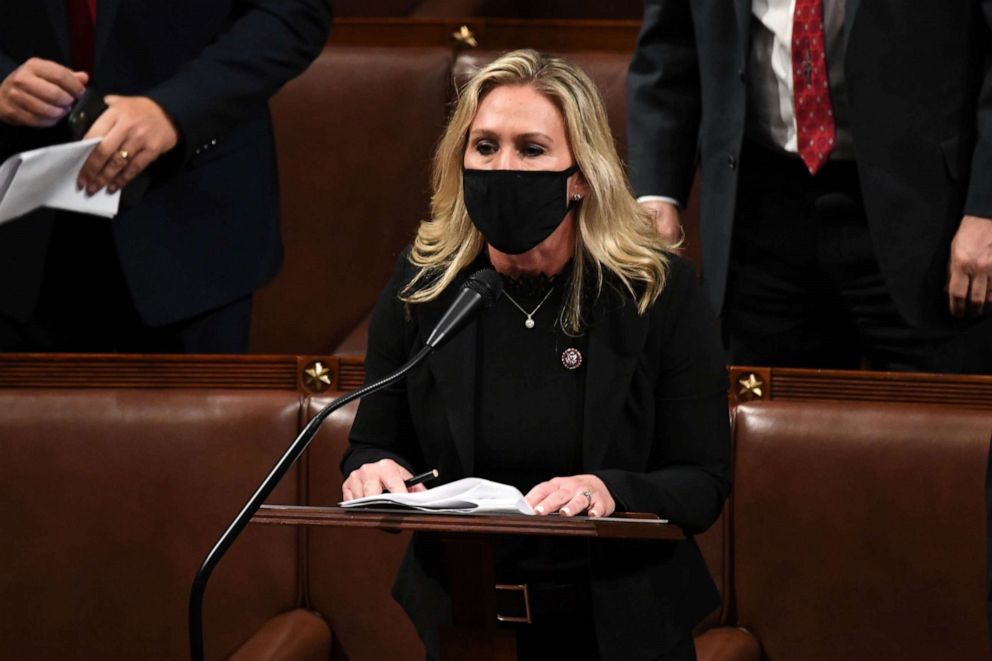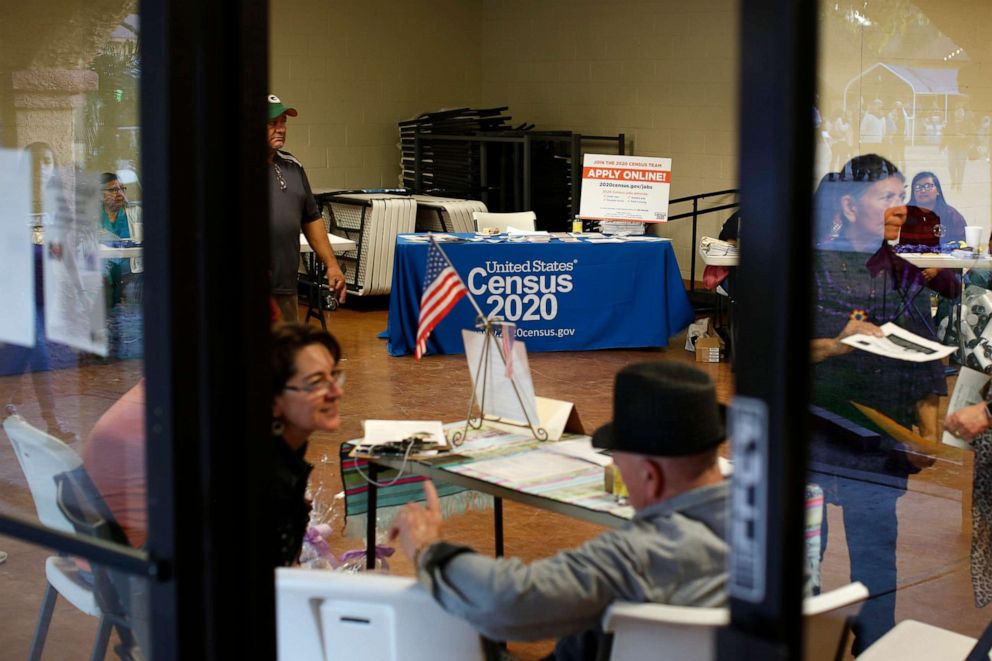Biden plays hardball as COVID relief decisions loom: The Note
Biden's hope is that progress brings unity, more than unity bringing progress.
The TAKE with Rick Klein
There was a school of thought that had President Joe Biden taking office as a naïve throwback, so ready to cut deals that he'd abandon Democrats to chase an imagined middle.
There was another theory that had Biden as captive to the left, a vessel that progressives would fill to limits defined largely during Biden's time out of elected office.

The truth is proving more complicated. In a critical pre-impeachment week for COVID-19 relief efforts, the White House is making inside and outside moves designed to keep alive multiple paths in a divided Washington -- with the president chasing 50 and 60 Senate votes simultaneously.
There's no holding back on the executive-order front, with a range of progressive priorities being addressed quickly and relatively decisively. Those interviews Vice President Kamala Harris gave to Arizona and West Virginia outlets sent their own message to Democrats, and different messages depending on their position on the political spectrum.
As for Republicans, the specific coronavirus ideas being outlined by 10 Senate Republicans Monday will either call a bluff or signal a breakthrough, even while Democrats pursue procedural means that could make most of those votes expendable.
Biden has already begun sharpening his tone; COVID relief "has to pass," Biden said Friday, "there's no ifs, ands or buts."
In framing the coronavirus as the first challenge among many that need addressing, Biden is aiming for a presidency built less on a political mandate than on actions viewed as mandatory. Biden's hope is that progress brings unity, more than unity bringing progress.
The RUNDOWN with Alisa Wiersema
As pandemic relief negotiations and an upcoming impeachment trial engulf Capitol Hill, Republicans are faced with another overwhelming challenge -- how to handle Rep. Marjorie Taylor Greene's extremism in a post-Trump political era. The burden of mitigating Greene's conspiracy-laden rhetoric with the potential political rebound of the Republican Party falls on the shoulders of GOP Minority Leader Kevin McCarthy.
So far, McCarthy has not fully addressed Greene or her conspiratorial rhetoric, despite intensifying calls for her resignation and expulsion. But distancing himself from the Georgia congresswoman could land the Republican leader in hot water with former President Donald Trump, who remains popular among the GOP's base.

"I had a GREAT call with my all time favorite POTUS, President Trump! I'm so grateful for his support," Greene said in a lengthy Twitter thread on Saturday, while promising to not back down or apologize. Greene's move to tie herself even more closely to Trump comes on the heels of McCarthy's own meeting with the former president following a turbulent end to his time in office.
Ahead of McCarthy's expected meeting with Greene this week, the top House Republican may have already indicated his intentions going forward.
In a subtle, but noticeable move on Friday, McCarthy's office sent out a highlight reel of GOP freshmen.
"Our Republican freshmen class is a strong representation of who America is and where we come from," the email said. Greene was not included in the list.
The TIP with Kendall Karson
The protracted delay in the delivery of data from the U.S. Census Bureau is leaving states and campaigns across the country in limbo, complicating the decennial mapmaking process and potentially hampering the 2022 midterm elections.
The embattled Census Bureau is now targeting April 30 for completing the apportionment count -- the data used to allocate congressional districts for each state before the drawing of both congressional and legislative districts begins-- several months after its December deadline. The process, largely bungled by the coronavirus and an unsuccessful effort by the Trump administration to exclude noncitizens from the census, has been ground to a halt. And with redistricting data not likely coming until the middle of the summer at the earliest, congressional candidates are preparing for fights on a House map that is currently undefined.

But it's not just members of Congress or state legislatures dealing with the ramifications of the delays, states too are entering uncharted terrain as they arrive eerily close to their own deadlines. Two states, Virginia and New Jersey, are running into their own legislative elections scheduled for later this year -- although New Jersey addressed potential delays last November.
Another 11 could crash into either constitutionally mandated or statutory redistricting deadlines in 2021, including Colorado, and Maine, according to the National Conference of State Legislatures. More than a dozen states are expected by state law to undergo the redistricting process the year after the Census, including Michigan, and the ripple effects are piling up elsewhere, with Texas possibly requiring a special session to draw new maps.
ONE MORE THING
A number of senior officials joining the Biden administration have been working in consulting firms with opaque client lists, which ethics experts warn may undercut President Joe Biden's efforts to ensure Americans have faith in the independence of its leaders. Many of Biden's picks have passed through the revolving door between public and private work, but have done so without ever appearing on the official registry of K Street lobbying firms, which must follow strict reporting rules.
THE PLAYLIST
ABC News' "Start Here" podcast. Monday morning’s episode features ABC News' Trish Turner on the COVID relief state of play in Congress as President Biden urges a new package "has to pass." ABC News Political Director Rick Klein also breaks down the implications of former President Trump switching up his defense team just days before the impeachment trial. http://apple.co/2HPocUL
WHAT YOU NEED TO KNOW TODAY
- President Biden and Vice President Harris receive the president's daily brief at 10 a.m. They are also meeting with Republican senators about the America Rescue Plan at 5 p.m. in the Oval Office.
- The White House COVID-19 Response Team and federal public officials, including the director of the National Institute of Allergy and Infectious Diseases and chief medical advisor to the president Dr. Anthony Fauci, will hold a press briefing at 11 a.m. to discuss the status of the federal government's COVID-19 pandemic response.
- Press Secretary Jen Psaki holds a press briefing at 12:30 p.m.
- The Senate convenes at 3 p.m.
- The House is pro forma at 3 p.m.
Download the ABC News app and select "The Note" as an item of interest to receive the day's sharpest political analysis.
The Note is a daily ABC News feature that highlights the key political moments of the day ahead. Please check back tomorrow for the latest.




